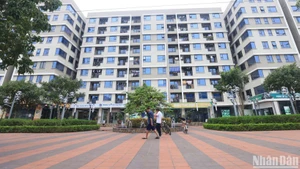However, in addition to positive results, the “hot” development of the real estate sector in recent times has revealed many limitations and potential risks, such as: the “supply-demand imbalance” of real estate, especially housing prices are still high compared to people's income; land use management in localities still has shortcomings; some localities have the phenomenon of land division, subdivision, and uncontrolled sale of land.
In addition, the real estate market’s activities still lack transparency and publicity due to the lack of information systems, poor control of the activities of trading floors, and real estate brokerage activities, leading to “chaos” in prices and “fake” real estate transaction prices.
More than a year ago, land in Hoai Duc District, about 25km from the centre of Hanoi, was announced for auction 3 times with a starting price of more than 60 million VND, but no investors participated, so the auctions were unsuccessful. This gloomy land auction situation also occurred in many suburban districts at that time.
But now, the same land plot more than an hour’s drive from the city centre has been auctioned for more than 100 million VND, the highest being more than 133 million VND per square meter. Also due to the land fever in the suburban districts that has been going on for many months, the price level of apartments and houses in Hanoi has been pushed to an unprecedented high.
In reality, the “fevers” of land and housing not only cause consequences for society, but also greatly affect the socio-economic development in localities. Especially when the land price level is pushed up, when implementing projects, the compensation price for land recovery will be many times higher, affecting the implementation of works serving the socio-economy.
This has also given rise to many land-related complaints, causing disorder and social insecurity.
The reasons leading to the real estate market's activities still showing signs of instability and unhealthiness include that: the legal system related to investment, construction, and real estate business still has some shortcomings; the implementation of investment and construction of real estate projects in most localities has encountered many difficulties, leading to a significant decrease in the supply of real estate and commercial housing compared to the previous period; and real estate prices, especially housing and land prices, have continuously increased and are too high compared to people's income.
Meanwhile, the control of investment capital flows into the real estate sector is not strict, still has potential risks, there are manipulation phenomena, lack of publicity and transparency related to the activities of real estate enterprises on the stock market; real estate corporate bonds have developed rapidly, lacking collateral; and there are phenomena of issuing bonds or mobilising capital but not using it for the right purpose.
It is forecasted that in the 2024-2025 period, bottlenecks in the approval of new residential projects will be resolved and the real estate market will recover when the Land Law 2024 is implemented on schedule.
To ensure the healthy development of the real estate market and make a more positive contribution to economic development, relevant ministries, departments and sectors need to coordinate synchronously in researching and perfecting the legal system related to the real estate sector, ensuring synchronisation, creating a legal framework and conditions for the real estate market to develop stably, healthily and sustainably.
It is necessary to closely monitor the situation and developments of the real estate market, inspect and review housing projects and real estate businesses to promptly remove obstacles in investment, land, planning and construction procedures.
Competent agencies need to continue to take measures to control and restructure real estate credit, ensure proper use and avoid risks; review and amend regulations related to land use rights auctions, and determine land prices to ensure consistency and suitability with local realities; and strengthening state management of planning, construction, real estate market and land management in localities, to have measures to manage and prevent illegal land division and subdivision, and land sale that is not in accordance with regulations and planning.
Along with that, it is necessary to improve the effectiveness of inspection, examination and review of land use rights auction organisation, project bidding, implementation of real estate projects, real estate business activities to promptly detect and strictly handle violations according to authority and regulations of law; directing to speed up the settlement of administrative procedures related to real estate projects; and strengthening inspection and examination to promptly guide and handle cases that cause difficulties and troubles in settling administrative procedures for people and businesses.
















